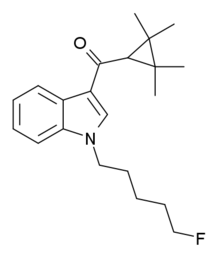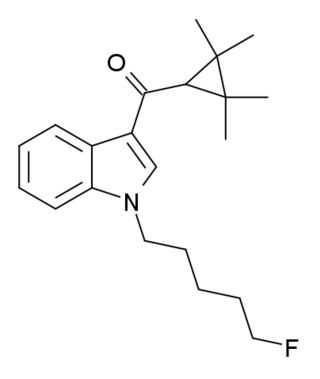XLR-11
Chemical compound From Wikipedia, the free encyclopedia
XLR-11 (5"-fluoro-UR-144 or 5F-UR-144) is a drug that acts as a potent agonist for the cannabinoid receptors CB1 and CB2 with EC50 values of 98 nM and 83 nM, respectively.[2] It is a 3-(tetramethylcyclopropylmethanoyl)indole derivative related to compounds such as UR-144, A-796,260 and A-834,735, but it is not specifically listed in the patent or scientific literature alongside these other similar compounds,[3][4] and appears to have not previously been made by Abbott Laboratories, despite falling within the claims of patent WO 2006/069196. XLR-11 was found to produce rapid, short-lived hypothermic effects in rats at doses of 3 mg/kg and 10 mg/kg, suggesting that it is of comparable potency to APICA and STS-135.[2]
 | |
| Legal status | |
|---|---|
| Legal status |
|
| Identifiers | |
| |
| CAS Number | |
| PubChem CID | |
| ChemSpider | |
| UNII | |
| KEGG | |
| CompTox Dashboard (EPA) | |
| Chemical and physical data | |
| Formula | C21H28FNO |
| Molar mass | 329.459 g·mol−1 |
| 3D model (JSmol) | |
| |
| |
Detection
A forensic standard for this compound is available, and a representative mass spectrum has been posted on Forendex.[5]
Recreational use
XLR-11 was instead first identified by laboratories in 2012 as an ingredient in synthetic cannabis smoking blends, and appears to be a novel compound invented specifically for grey-market recreational use.[6]
Legal Status
XLR-11 was banned in New Zealand by being added to the temporary class drug schedule, as of 13 July 2012[update].[7]
The U.S. Drug Enforcement Administration (DEA) made XLR11 illegal under the Federal Controlled Substances act for the foreseeable future as of January 2024[update].[8]
It has also been banned in Florida as of 11 December 2012[update].[9]
Arizona banned XLR-11 on 3 April 2013.[10]
As of October 2015[update], XLR-11 is a controlled substance in China.[11]
Side effects
XLR-11 has been linked to hospitalizations due to its use.[13]
Toxicity
XLR-11 has been linked to acute kidney injury in some users,[14] along with AM-2201.[15][16]
See also
References
Wikiwand - on
Seamless Wikipedia browsing. On steroids.
